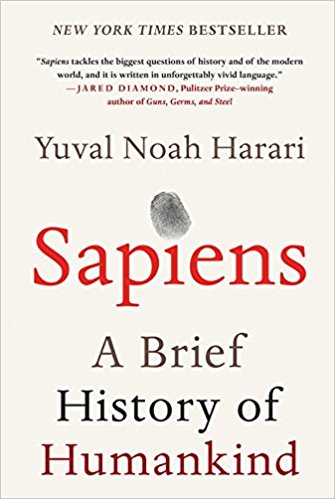On a hike in East Africa 2 million years ago, you might well have encountered a familiar cast of human characters: anxious mothers cuddling their babies and clutches of carefree children playing in the mud; temperamental youths chafing against the dictates of society and weary elders who just wanted to be left in peace; chest-thumping machos trying to impress the local beauty and wise old matriarchs who had already seen it all. These archaic humans loved, played, formed close friendships and competed for status and power – but so did chimpanzees, baboons and elephants. There was nothing special about humans.
We are already in the Matrix, Harari says it right there on page 35. Except we’re not batteries for an external system, we’ve just created a reality for ourselves that is completely fictional, ‘imagined realities’. They are not lies, as Harari points out, monkeys can lie, but they are common beliefs that all humans’ share that make them a reality. A very powerful reality. While things like Lions, Trees and Rivers are real physical entities, Limited Liability Companies, Nations, Money, are all inventions of the human imagination.
I found Sapiens absolutely fascinating, Harari slices through fiction, spin, history and belief with a sharp blade, revealing the truth about our species with a bold, unflinching glare. I learnt what a Diprotodon was, I learnt that humans were domesticated by wheat, not the other way round. Foragers were more successful with a wider diet, if they could not find something, there would be something else to eat instead. The Agricultural Revolution separated us from nature and gave us the future. We ate less variety of food, and were susceptible to droughts and bad harvests.
Giving a brief history from the first peoples to what do we want as a species today, Sapiens tackles some big subjects but Harari keeps the tone light and informative and littered with contemporary cultural references. }
But in the beginning I felt I was learning about myself as much as Sapiens.
When I reviewed One River by Wade Davis I was moaning about the many technical terms for the fauna he was describing and how I initially found them a barrier. At the beginning of Sapiens I found it too easy to read and understand, and the statements he made and references were merely there to shock or provoke a reaction. It triggered a thought process in my head, that I had become a snob, that a book had to be slightly difficult to read to be worthwhile or valid. I argued against myself that this was an important subject and that writing it in a way to make it accessible to as many people as possible was exactly how it should be written. Then I thought, despite the copious amount of references sign posted, that somehow this was like fake news, the very manner of Harari’s writing sometimes felt like he was portraying everything as fact, as this is the way it is, but in fact it was just his interpretation.
As I disappeared further into the book though my thinking changed (or perhaps I stopped thinking). It is precisely Harari’s style that makes the impact by the end. At one point he explains how the state and the free market has replaced the family and community in an individuals life, carefully explaining how this happened and it’s evolution. It’s not sensationalised, a tabloid scream out from the page, despite being explained over several pages, it feels considered and understated. Harari doesn’t judge, the theory is put down on the page for you to read and think about.
Religion is a good example of this. Sapiens flatly rejects any notion of God, in any format or number. It looks into the evolution of religion and the roles it has played, and again, Harari follows his arguments through to interesting conclusions.
So, monotheism explains order, but is mystified by evil. Dualism explains evil, but is puzzled by order. There is one logical way of solving the riddle: to argue that there is a single omnipotent God who created the entire universe – and He’s evil. But nobody in history has had the stomach for such a belief.
When I finished thinking, or indeed started thinking again, my conclusion was that the human race can be compared to Voldemort, We have done great things. Terrible, yes, but great things. Sapiens explains how as a species we have exponentially confounded all previous notions of the speed and impact of revolution. How we are becoming a global hegemony based on our collective belief in things that do not exist, yet we have absolute faith in. Aha! God you say. Money Harari says, Nations. These have replaced God.
The fact that people all over the world know what these are and for the most part feel strongly about one or both of them, and values them over actual physical objects such as the natural world, shows how far we are inside our the matrix.
Where is Neo?
Perhaps in Homo Deus. I’ll let you know.
If we combine the mass extinction in Australia and America, and add the smaller-scale extinctions that took place as Homo Sapiens spread over Afro-Asia – such as the extinctions that occurred when ancient foragers settled remote islands such as Cuba, the inevitable conclusion is that the first wave of Sapiens colonisation was one of the biggest and swiftest ecological disasters to befall the animal kingdom. Hardest hit were the large furry creatures. At the time of the Cognitive Revolution, the planet was home to about 200 genera of large terrestrial mammals weighing over fifty kilograms. At the time of the Agricultural Revolution, only about a hundred remained. Homo Sapiens drove to extinction about half of the planets big beasts long before humans invented the wheel, writing or iron tools.
